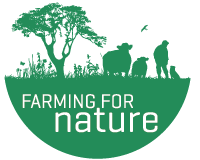Harriet Roach & David Andrews
Harriet Roach and David Andrews farm 7 hectares on Bere Island in West Cork. They are certified organic, run a small herd of Dexter cattle and have a one-acre market garden. The farm is a mixture of improved grassland, semi-improved grassland and dry heath. The Dexters are well suited to the rocky uplands given their hardy nature and lighter frame. The cattle play a crucial role in maintaining the diverse pasture. External inputs are very low on the extensively managed farm. The cattle overwinter outdoors and some hay is cut off the better land to supplement the animals during the winter months. Farmyard manure is composted to produce a supply of organic matter for the vegetable beds. The organic vegetable produce is sold at the local farmers market during the summer months, which Harriet helped to set up in 2021.
The farm is partly within the Beara Peninsula Special Protection Area (SPA) which is designated primarily because of its international importance for Chough. The farm is in the NPWS farm scheme, where Harriet and David are taking numerous actions to protect biodiversity on the land and to support the Chough and the endangered Marsh Fritillary butterfly. Harriet and David are proud of the high nature value of the land they farm and its importance in terms of wildlife and biodiversity.
Nomination:
Harriet and David organically farm 7 hectares on Bere Island, Co Cork and have a 1/19th share in 150ha commonage. They have a small herd of Dexter cattle which graze year-round and are out-wintered. Their farm is a mixture of improved grassland, semi-improved grassland and dry heath. They use no artificial fertilisers or herbicides.
The farm is partly within the Beara Peninsula Special Protection Area (SPA) which is designated primarily because of its international importance for Chough. This bird is listed on Annex I of the EU Birds Directive and SW Ireland is one of its strongholds in Europe.
Harriet and David are keen to farm in a way which benefits Chough and other aspects of biodiversity on Bere Island. In order to ensure a mosaic of habitats is maintained, thus maximising the high nature value of the farm, they have been actively managing the farm not alone by grazing, but by strimming to maintain a mix of open and closed areas. A special feature of the farm is the field boundaries which are mostly grazed vegetated earthen banks, which are favoured by foraging Chough.
Harriet and David were looking at implementing additional measures to benefit biodiversity and to this end applied to participate in the NPWS farm plan scheme. Their application was successful and a plan was drawn up for the farm. Running from 2021-2025, the farm plan focusses on Chough and Marsh Fritillary, a rare butterfly which occurs on Bere Island. Chough prefer short vegetation swards rich in invertebrates. In contrast, Marsh Fritillary require areas of taller vegetation where their larval food plant Devil’s-bit Scabious is abundant.
Some of the measures they are undertaking include control of bracken encroachment by strimming, thus avoiding the use of herbicides; late-cutting of hay in two fields; introduction of a small organic tillage area (which they hope will provide a forage area for chough post-cropping); ensuring the grasslands and vegetated earthen banks are appropriately grazed to benefit foraging Chough; use of seaweed as fertiliser; avoiding the use of avermectins (anthelmintics) to ensure the cowpats and soil remain rich in the invertebrates that Chough depend on; timing of works to minimise any impacts on nesting birds; and maintaining patches of taller wet heath/wet grassland vegetation with Devil’s-bit Scabious with the hope of attracting Marsh Fritillary butterflies.
Outside of the main farm, Harriet and David are involved in other activities on the island. Harriet was instrumental in setting up Bere Island’s weekly farmers’ market which began in 2021 and where she sells organic vegetables, salads and herbs. David has a small on-farm business ‘The Laughing Oyster’ (founded 2015) which produces dried seasonings made from locally harvested seaweed and sold in supermarkets and wholefood shops.
Nominator: Clare Heardman, Conservation Ranger, NPWS




